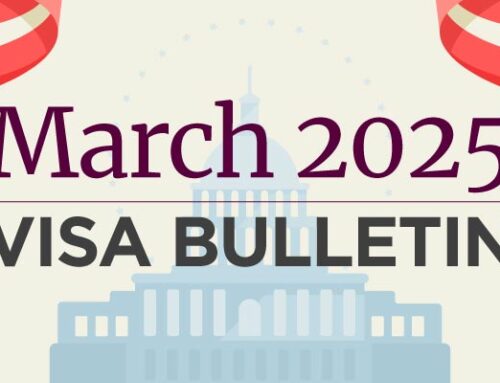How to Transfer the Underlying Basis of pending Adjustment of Status Applications after downgrading from EB-2 to EB-3
On January 21, 2022, the USCIS introduced new guidance regarding the process to transfer the underlying basis of a pending adjustment of status application from one employment-based immigrant visa category to another.
Transferring the underlying basis from one immigrant category to another is not a new process and has been available for years. However, the new guidance focuses on employment-based petitions because “there are an exceptionally high number of employment-based visas [in the EB-1 and EB-2 categories] available this fiscal year.” This guidance was extremely valuable for our Indian and Chinese clients who downgraded from the EB-2 category to EB-3 in 2021.
Downgrading from the EB-2 category to the EB-3 category
In October 2020, the priority dates for the EB-3 category had surpassed the EB-2 category. As a result, several of our Chinese and Indian clients decided to downgrade from EB-2 to EB-3 in order to take advantage of the current priority dates in the EB-3 category with the hope that their applications would be adjudicated. However, a few months after downgrading, the adjustment of status applications were not yet adjudicated, the EB-3 category retrogressed, and the EB-2 category moved ahead (some becoming current). This put our downgraded clients back in the same position as when they started – stuck waiting on their priority date to become current.
Transfer the Underlying Basis from the EB-3 category to the EB-2 category
We received many questions from these clients seeking advice on how to get their adjustment of status applications back under the EB-2 category. Should they file another adjustment of status application and pay more fees? Should they try to interfile? Fortunately for our clients, USCIS announced new guidance on transferring the underlying basis for employment-based petitions.
How exactly does transferring the underlying basis help our downgraded clients get back into the EB-2 category?
If you have an approved EB-2 I-140, but filed another I-140 petition (EB-3) in order to downgrade, we can submit a written request to the USCIS on your behalf to transfer the pending adjustment of status application from the underlying EB-3 I-140 to the approved EB-2 I-140.
You can make this request as long as the Adjustment of Status application (based on the original I-140):
- Is still pending;
- There is no break in continuity;
- You are eligible for a visa in the new immigrant category; and
- A visa is immediately available in the new immigrant category.
Supplement J with Written Transfer Request
In some cases, you will also need to submit a completed I-485 Supplement J, Confirmation of Bona Fide Job Offer or Request for Job Portability under INA Section 204(j) with the written transfer request. The following guidelines help to determine whether you need to file a Supplement J with your written request to transfer the underlying basis:
- If you are requesting to transfer your underlying basis to a previously filed and approved Form I-140, you should submit Supplement J with your transfer request.
- If you are requesting to transfer your underlying basis to a Form I-140 that remains pending, you do not need to submit Supplement J.
- If a new Form I-140 is being filed on your behalf and you are eligible to concurrently file, you may request to transfer the underlying basis of your pending Form I-485 to this new petition (as long as it includes a copy of the I-485 receipt notice, the required cover sheet, and a letter requesting that your pending Form I-485 be transferred to the new petition) In this case there is no need to submit Supplement J.
Transfer requests that are accompanied by a Supplement must be filed at the following address (through September 30, 2022):
Attn: I-485 Supp J
U.S. Department of Homeland Security
USCIS Western Forms Center
10 Application Way
Montclair, CA 91763-1350
Employment-based transfer requests that are not accompanied by a Supplement J should be submitted in writing to the USCIS office with jurisdiction over the pending I-485 application.
Decision to grant/deny request to transfer is discretionary
The decision to grant or deny a request to transfer rests solely in the discretion of the officer. The officer may consider the following:
- The reason(s) for the request;
- The availability or unavailability of documentation to support the new claim;
- The degree of difficulty in obtaining needed receipt files from other USCIS offices;
- The degree of difficulty in determining the applicant’s continued eligibility from the first underlying petition or basis; and
- The extent of processing steps already taken on the adjustment application
Will Transfering the Underlying Basis Make the USCIS Adjudicate My Case?
After USCIS released this new guidance, our firm submitted several “transfer of underlying basis” requests to USCIS, asking that they transfer the pending adjustment of status applications of various clients, from the underlying EB-3 I-140 to the approved EB-2 I-140. It is important to note that USCIS will not provide a written response to transfer requests. However, it will issue receipt notices for the Supplement J. Since this is a new procedure, please keep in mind that it could take months to issue receipt notices for this Supplement J. Our cases were filed with related Supplement J forms in early February, and we only recently received receipt notices in late April / early May.
We are still waiting to see the results of this new policy. We are hopeful that this new process will be beneficial to our clients who have already waited years for their green cards due to visa backlogs. This would mean that their adjustment of status applications will finally be adjudicated and their green cards approved. Ideally, this would be by the end of the fiscal year (September 30, 2022), but for now, we can only wait and see.
This blog post is provided as an educational service and is not legal advice. Please consult with an attorney for your specific circumstances.
About the Author
Nadia Deans Kalata
Nadia Deans Kalata is Senior Counsel at Garvish Immigration Law Group, LLC in Atlanta, Georgia. Born and raised in Kingston, Jamaica, Nadia developed her passion for immigration law through her own personal experience with the immigration process in the United States. As a result, she has a unique perspective and understanding of her clients’ concerns and the challenges they face when dealing with the U.S. immigration system. Nadia has over fifteen years of experience in corporate immigration.







